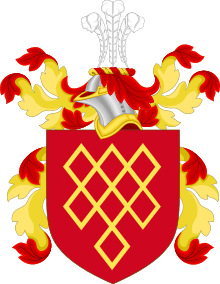Edmund Quincy (1628–1698)
| Edmund Quincy II | |
|---|---|
 Coat of Arms of Col. Edmund Quincy II | |
| Born |
1628 England |
| Died | 1698 |
| Other names | Edmund Quincy II |
| Occupation | Soldier, Planter, Politician, Merchant |
| Title | Colonel |
| Spouse(s) | Joanna Hoar, Elizabeth Gookin |
| Children | 12 (including Edmund Quincy III and Josiah Quincy I) |
| Parent(s) |
Col. Edmund Quincy I (1602–1636) Judith Pares |
Col. Edmund Quincy II (/ˈkwɪnzi/; 1628–1698) was an American Massachusetts Colonist, soldier, planter, politician, and merchant. He emigrated to colonial Massachusetts in 1633 with his father, Col. Edmund Quincy I (1602-1636).
Early life
Edmund Quincy II was born in England in 1628. He was the son of Col. Edmund Quincy I (1602-1636). In 1633, at around 5 years old, he emigrated to colonial Massachusetts with his father.
Career
Edmund was magistrate, representative to the general court and a Lt. Colonel in a Massachusetts militia regiment. In 1689 was a member of the provisional government (Committee of Safety). This was a time of turmoil in the colonies and England. The disliked Governor Edmund Andros of the Dominion of New England was placed under investigation by the Committee, while in England the Glorious Revolution (James II fled to France) and the Bill of Rights brought fundamental changes to the political structure. Colonel Quincy started work in on the family property, called the Quincy Homestead, around 1696.
Personal life
His first wife was Joanna Hoar, sister of Leonard Hoar (President of Harvard College) and they had 10 children. Edmund and his second wife, Elizabeth, the widow of Rev. John Elliot of Newton and daughter of Major General Daniel Gookin, had 2 children.[1]
- Edmund Quincy III (1681-1737) was very active in colonial affairs, like his father.
- Col. Josiah Quincy I (1710-1784) was a planter, politician, and merchant, also like his father.
His grave was once marked with two granite columns embossed with lead. The lead was stripped for use by the colonists during the Revolution. This was noted by President John Adams.
Descendants
Many of Edmund's descendants were active in the American Revolution, some of the more notable being John Quincy Adams, Dorothy Quincy, and Col. Josiah Quincy I. The family intermarried with other local South Shore families, especially with the Hobarts of nearby Hingham.
Notes and references
- ↑ "Genealogical and Personal Memoirs Relating to the Families of Boston and Eastern Massachusetts, Vol II", by William Richard Cutter, Lewis Historical Publishing Co., New York (1908), pp. 592-598.
See also